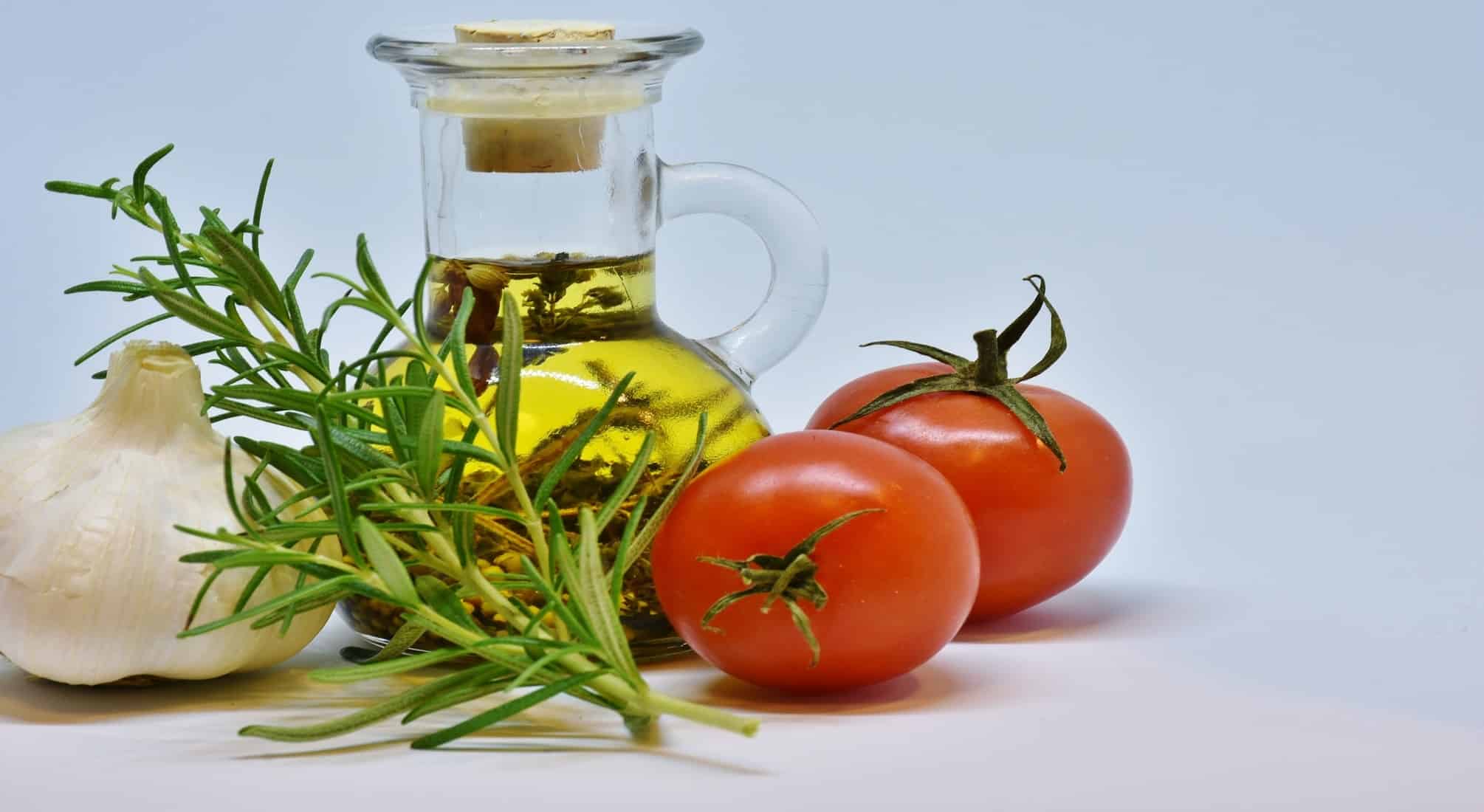Canola oil and vegetable oil possess many similarities such as indistinguishable color and neutral flavor. It is sometimes difficult to recognize them in the kitchen pantry if the oil bottle is not labeled. Ever wondered what’s the difference between these staples? Can you use canola oil instead of vegetable oil? Are they interchangeable? Stick around! In this article, we will dive deep and explore all the major details of canola oil and vegetable oil.
WHAT IS CANOLA OIL ?

Canola oil is a vegetable-based oil extracted from the seeds of the canola plant. Each canola seed contains 45% of oil on aggregate.
Canola plant is a yellow-flowering plant that belongs to the Brassicaceae family. Research studies suggest that rapeseed was considered as a high-erucic acid crop until a group of Canadian scientists were able to improve the quality of rapeseed through plant breeding in 1976.
The word “canola” means Canadian oil. Canada registered this word in 1979 representing a low erucic acid and low glucosinolates oil.
Canola oil consumption started to boost up from year 1985 when U.S FDA officially recognized canola oil as a safe product for dietary consumption. As of today, canola oil has the third largest production volume after soybean and palm oil. Canola oil is also one of the most consumed oils in the United States, second only to soybean oil.
Manufacturing Steps
As per the Canola Council of Canada, there are various steps involved in the canola oil manufacturing process as explained below.
Seed cleaning: Separation of canola seed and cleaning of dirt and plant stalks.
Seed conditioning and flaking: Preheating at 35-degree Celsius and flaking by roller mills.
Seed cooking: Steam-heat cooking of the roller mills at 80-105-degree Celsius for 15-20 minutes.
Pressing: Seed flakes are pressed by screw pressers to extract 50-60% oil.
Solvent extraction: The use of hexane to extract the remaining 18-20% oil.
Desolventizing: Hexane removal from canola through steam heating at 95-115-degree Celsius.
Oil Processing: Oil refining by various ways like exposure to phosphoric acid, steam distillation and filtration.
Components of Canola Oil
Canola is among the most vital oilseed crops worldwide. As per research study, canola oil is characterized by the following:
1. Low level (7%) of saturated fatty acids (SFAs)
2. Substantial amounts of monounsaturated fatty acids (MUFAs)
3. Polyunsaturated fatty acids (PUFAs):
61% oleic acid
21% linoleic acid
11% alpha-linolenic acid (ALA)
Plant sterols (0.53–0.97%)
Tocopherols (700–1,200 ppm)
Nutrition Facts of Canola Oil
As per the U.S. Department of Agriculture, a tablespoon of canola oil (15ml) contains 124 calories, 12% of the reference daily intake of vitamin E and 12% of the reference daily intake of vitamin K. It also consists of 28% polyunsaturated fatty acid and omega-3 fatty acids as well as 4% of trans fats.
WHAT IS VEGETABLE OIL ?

Vegetable oil is actually a broad term referring to the mixture of different types of plant-based oils such as corn, safflower, soybean, sunflower and so on. It is commonly used for every day cooking due to its affordable low price. Like canola oil, it also has a neutral flavor and high smoke point.
One interesting point to note is that with this type of generic oil, you are probably less likely to know the exact components of it. It is difficult to understand from which plants the oil is extracted and the exact manufacturing process of this type of oil.
Composition of Vegetable Oil
It is no easy feat to get to know the exact composition of the vegetable oil. Various research studies have been done in quest to figure out that. In one particular research study, samples from fourteen vegetable oils were obtained using gas chromatography method. All the samples were in pure form with no processing done.
It is found that the distribution of fatty acid i.e. monounsaturated fat, saturated fat and polyunsaturated fat in each vegetable oil was different. The study also concluded that there were high amounts of n-6 PUFA in most of the vegetable oils.
Nutrition Facts of Vegetable Oil
The nutritional components of vegetable oil differ according to the plant composition. In general, vegetable oil is composed of lipids as well as monounsaturated, saturated and polyunsaturated fatty acid.
Besides, a recent study suggests that various vegetable oils such as sunflower and safflower oil have a higher energy contribution than the recommended intake.
CANOLA OIL AND VEGETABLE OIL COMPARISON
At this point, you may wonder whether you can use canola oil instead of vegetable oil? Well, canola oil and vegetable oil may actually be used interchangeably in recipes. However, they do have different qualities and best use. The following explains two main differentiation factors of these oils:
1. Nutritional Values
In comparison, canola oil has a higher content of vitamin E & K. Another key nutritional differentiation point is that there is a relatively high concentration of oleic acid in canola oil when compared to most other vegetable oils except for the high oleic sunflower oil. As such, canola oil plays an indispensable role in preventing cardiovascular diseases.
2. Disease Management
A research study was conducted to examine the treatment of Jurkat T leukemia cells by free fatty acids of canola oil and corn oil. Results showed a reduction in inflammatory cells which were treated with canola oil fatty acids whereas corn oil treatment was pro-inflammatory. It indicates the use of canola oil instead of corn oil in the diet tends to be beneficial for inflammatory diseases.
Canola oil also contains omega-3 fatty acids which aid in the reduction of triglycerides (bad cholesterol) and improve heart health.
On the other hand, it is worthy to note that the long-term usage of vegetable oil may cause inflammatory conditions like arthritis as well.
HEALTH BENEFITS OF CANOLA OIL

Canola oil is one of the most widely used oils among people. As per research studies, integrating it into the diet does provide a wide array of promising health benefits to our body as explained below.
Improves Cholesterol Levels
Canola oil helps improve cholesterol levels and may aid in the treatment of hypercholesterolemia. Triglycerides are the main constituents of body fat in humans. It should not be excessive so as to maintain body health. It is found that canola oil diet consumption reduces TAG levels by 15.8% on average.
A research study also put forward that the high oleic acid content in canola oil fosters the reduction of low density lipoprotein and cholesterol levels, as such could be an effective mean in managing hypercholesterolemia.
Canola oil is also low in saturated fat and high in monounsaturated fat, further improving cholesterol levels. It is thus mostly considered to be one of the healthy oils.
Strengthens Immune System
Olive oil is packed with antioxidant and antithrombotic compounds which help strengthens the immune system. Clinical trials of canola oil diet in critically injured patient confirmed drastic improvement in the response of leukocytes. It shows that dietary nutrient modification such as including canola in the diet may have pharmacological value in improving the immune system.
Fosters Weight Management
Canola diet helps increase satiety and decrease food cravings, hence fosters weight management. A systematic review has examined the role of canola oil on body composition. It revealed that canola oil diet could lead to significant body weight reduction as compared to other oils containing saturated fatty acids. Yet, further research is still required to confirm the consistency of the results.
Lowers Blood Sugar Level
Canola oil may also help in the treatment of diabetes by lowering blood sugar levels and increasing glucose tolerance and insulin sensitivity. A research study from the American Diabetes Association Diabetes Care Journal measured the effect of lowering the glycemic load with canola oil. It revealed that canola oil enriched diet does improve glycemic control in patients with type 2 diabetes mellitus. This shows that consuming canola oil may be associated with the lowering of blood sugar level.
Lessens Risk of Cancer
Canola oil is likely to reduce cancer cell growth and lower the risk of breast cancer as well. In one study, it is found that women using vegetable oil tends to have 30% higher chances of having breast cancer as compared to women integrating canola oil for cooking.
Another study conducted on rats was carried out to examine colon tumor development through consuming canola oil. The study revealed that, as compared to the corn oil group, canola oil consumption resulted in higher levels of w-3 fatty acids and lower levels of COX-2. This put forward that dietary canola oil may play a chemo preventive role in colon tumor progression in animal group.
A couple research studies do support that canola oil diet may be helpful in lowering the risk of developing cancer related diseases, however, more studies are still needed to establish a valid association.
Promotes Heart Health
Canola oil plays a vital role in the improvement of cardiovascular heart disease as it contains less saturated fat than other common consumed oils.
In 2006, US FDA approved the claim that 1.5 tablespoons of canola oil may reduce the life-threatening risk of coronary artery heart disease due to the presence of healthier unsaturated fatty acid.
Canola oil is indeed considered as a heart-healthy oil by many through its effects on blood pressure, cholesterol as well as inflammation. Still, there is a need for more conclusive research studies to put forward such claim.
HEALTH RISK OF CANOLA OIL

Canola oil is currently among the largest oil crops worldwide. With its continuous expansion particularly in the commercial sector, it is worthy to study the negative impact of canola oil on our health.
High Omega-6 Fat Content
Canola oil contains higher omega-6s than omega-3s. Due to such imbalance, it may sometimes lead to the development of diseases. Therefore, you should always try to consume and maintain a healthy balanced diet.
Negative Impact on Memory
Numerous animal studies showed that canola oil rich diet exacerbated memory problems and led to increase in weight as well.
In one 6-month research study of mice with Alzheimer’s disease, researchers fed the control group of mice with standard diet and the experiment group with two tablespoons of canola oil every day.
The team noticed that the experimental group weighed more than the control group after the study. Also, the working memory, short-term memory was all negatively impacted among the mice that consumed canola oil over the study.
In another randomized control study, 180 adults were exposed to various cooking oils including canola oil and extra virgin olive oil. It was found that only the group consuming 20-30 ml of extra virgin olive oil daily showed marked improvements in memory functions. This shows that the consumption of canola oil might impact the memory function.
BEST USE OF CANOLA OIL
Canola oil among the most versatile cooking oils. It has a smooth texture, neutral taste and high smoke point. You may easily sprinkle it over the salad or even use it in sauces for a healthier option.
Canola oil is a popular cooking oil choice in the western countries for deep-frying, stir-frying, baking, grilling as well as pan-frying.
Canola oil is relatively cheap and easily available. It also costs lower than high quality extra virgin olive oil. Study suggests that canola oil is the sole oil that contains proper ratios of monounsaturated, saturated and polyunsaturated fatty acid.
Food and Drug Administration of the United States Department of Health and Human Services has approved canola oil for its Generally Recognized as Safe status.
STORAGE OF CANOLA OIL

Canola oil is generally safe to consume, yet it is of paramount importance to use and store with care. Canola oil has to be kept in an air-tight bottle, otherwise exposure to the air may lead to peroxide breakdown. This could eventually lead to unpleasant odour and strange taste.
Extreme measures should be taken in terms of placement. In particular, cooking oils should only be placed in a dry and cool place and kept away from sunlight and stove to avoid any unwarranted outcome.
In general, cooking oils should be discarded immediately after the expiration date. If you have bought a bigger bottle, do consider transferring some cooking oil to a small bottle for initial use and refrigerate the remaining for prolong use.
KEY TAKEAWAYS
All in all, it is quite evident that you may use canola oil instead of vegetable oil. There have been various studies validating the health benefits of canola oil as compared to other cooking oils.
Canola oil is budget-friendly and readily available worldwide. Although there are some health concerns involved, the potential health benefits and overall features of canola oils is quite promising.
Before deciding over the long-term usage of any cooking oil or making significant changes to your lifestyle and diet, it is highly recommended to always consult a nutritionist or a medical doctor for their professional advice regarding your diet to avoid and minimize health risk.





0 Comments